‘We’re not just facing a threat to Jews in north London – this is the shutting down of democracy’
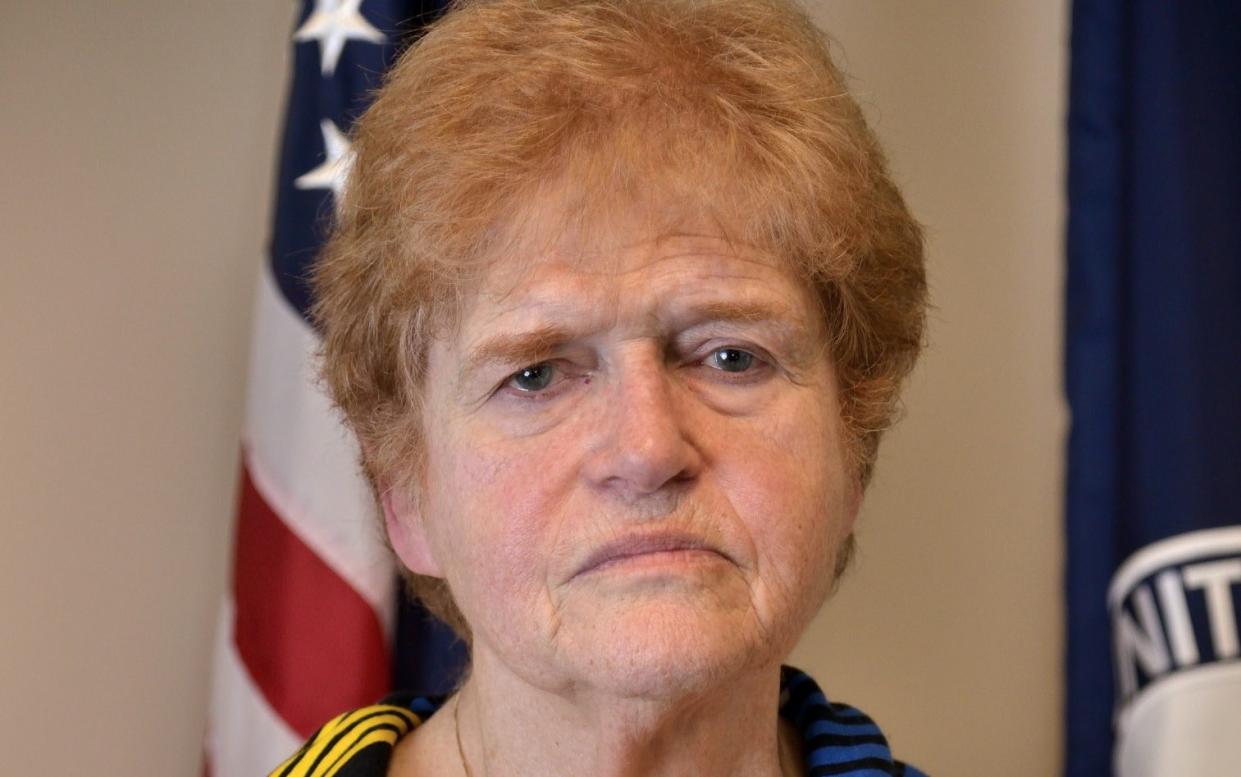
Ambassador Deborah Lipstadt has made fighting hatred against Jews her life’s work. And since October 7, as Joe Biden’s special envoy to monitor and combat anti-Semitism is fond of putting it, she has been working in a “growth industry”.
Lipstadt has found herself reckoning with a record wave of attacks on Jews globally in light of Hamas’s attack and Israel’s subsequent response. “Business is booming,” she joked recently of her office’s portfolio, “I’m the only one in the Biden-Harris administration hoping for a recession.”
Dark humour is one of the most powerful tools in Lipstadt’s arsenal – a useful quality when the scale of the crisis confronting her has never been more grave. She has travelled to more than 20 countries since she took on the post in 2022 at the US president’s behest.
When we meet in her office, several floors up in the State Department’s quaint wood and marble Harry S Truman building in Washington DC, she has just returned from a trip to London. Tiny, at just 5ft, but with a commanding presence, she is dressed all in black with a brightly coloured scarf around her shoulders, similar to the scarves she lent Rachel Weisz to wear when the actor portrayed her in Denial.
The film depicts the infamous libel suit the Holocaust denier David Irving, played by Timothy Spall, brought against Lipstadt, at the time a little-known but respected historian.
Her pride is palpable as she enthusiastically points to a Japanese poster of the 2016 film featuring Weisz hanging on her office wall as she enters.
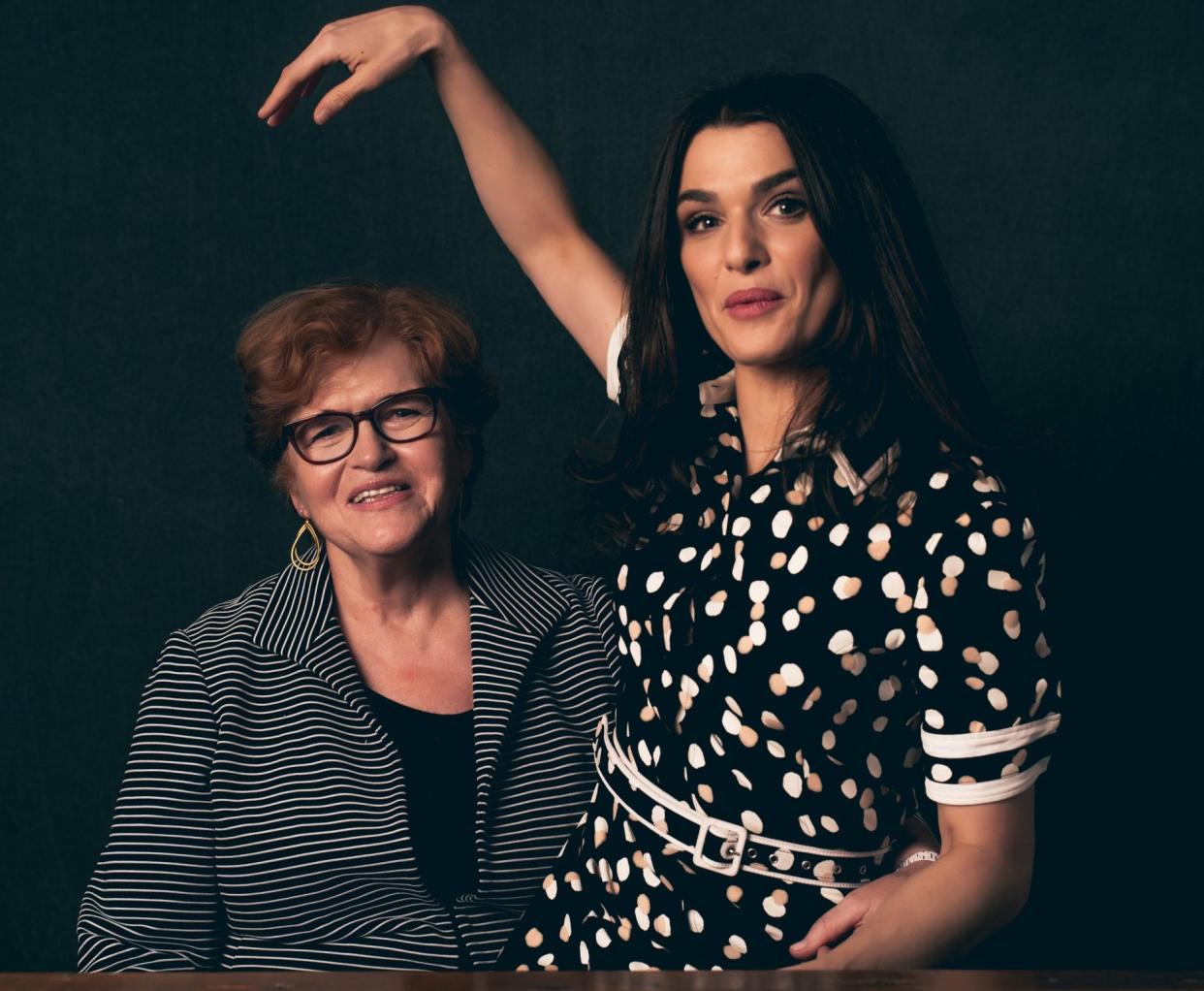
Years after the protracted legal battle in the Royal Courts of Justice, where Lipstadt ultimately prevailed against Irving, she still considers Britain to be something of a second home. She visits regularly, to see friends and accept invitations to lectures, and now on US government business, but the scenes playing out on the capital’s streets on this most recent trip have left her troubled.
It is not just the sound of “anti-Semitic” chants reverberating through London in recent weeks that she finds “disturbing”, but the thousands of marching protesters who have remained conspicuously silent on the point.
“If they say ‘we’re not engaging in anti-Semitism’, [well then] call out the anti-Semitism,” she says. “You can say, ‘well I was just marching next to them’, well, that’s a pretty lame excuse when it comes to the prejudice of Jew hatred.”
The wider problem, she says, is that by “choosing to march with them”, the protesters are “giving a certain imprimatur” to the demonstrations’ extremist fringe.
Lipstadt is clear that she is a fierce advocate for free speech. “That’s what makes our countries special,” she says, and draws a clear distinction with criticising the Israeli government, something, she notes, many Israeli citizens have done.
Her own boss, President Biden, has also been increasingly critical of Benjamin Netanyahu and triggered a diplomatic spat with the Israeli prime minister this week when the US ended a months-long impasse at the UN to allow a resolution calling for an immediate ceasefire in Gaza. Netanyahu took the White House by surprise and cancelled his delegation’s visit to Washington in response.
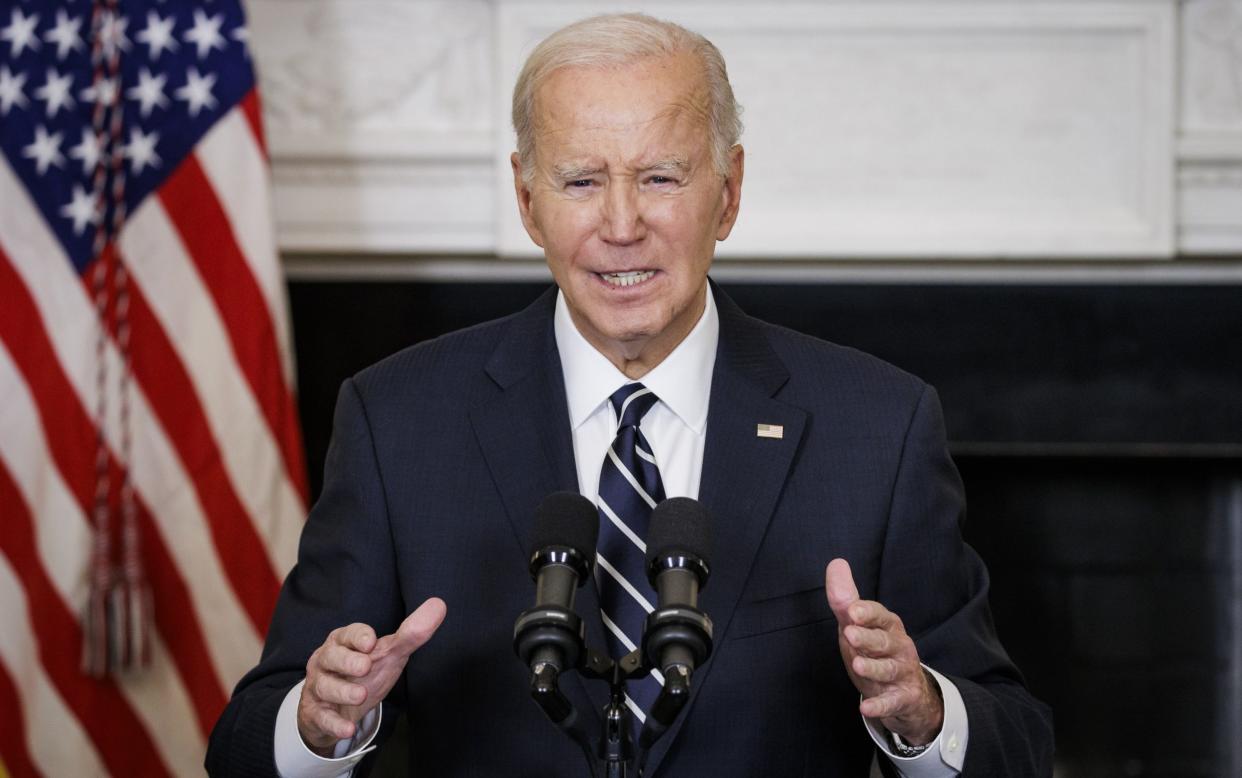
Critiquing Israeli government policy is one thing, but, Lipstadt believes, the recent demonstrations in Britain and elsewhere have strayed beyond that and “crossed the line into anti-Semitism”.
She is aware of criticisms of British policing, but she says there is also an onus on the marchers and their organisers to police the actions of those who join them. “If I were on a march, and someone began to engage in overtly racist kinds of comments or misogynist kinds of comments, whatever it might be, I would distance myself from the person,” she says.
Her trip to London coincided with the heated and chaotic scenes that played out both inside and outside Parliament, with SNP and Tory MPs walking out of the Commons chamber in protest, and hundreds of demonstrators beating drums and chanting gathered outside. “It’s very sobering,” she says.
She is perturbed by the potential implications of the Commons Speaker Lindsay Hoyle’s controversial decision to upend convention over a Parliamentary debate on the crisis in Gaza. “If he changed the rules because MPs were frightened for their security, that’s the beginning of a failed state,” she says.
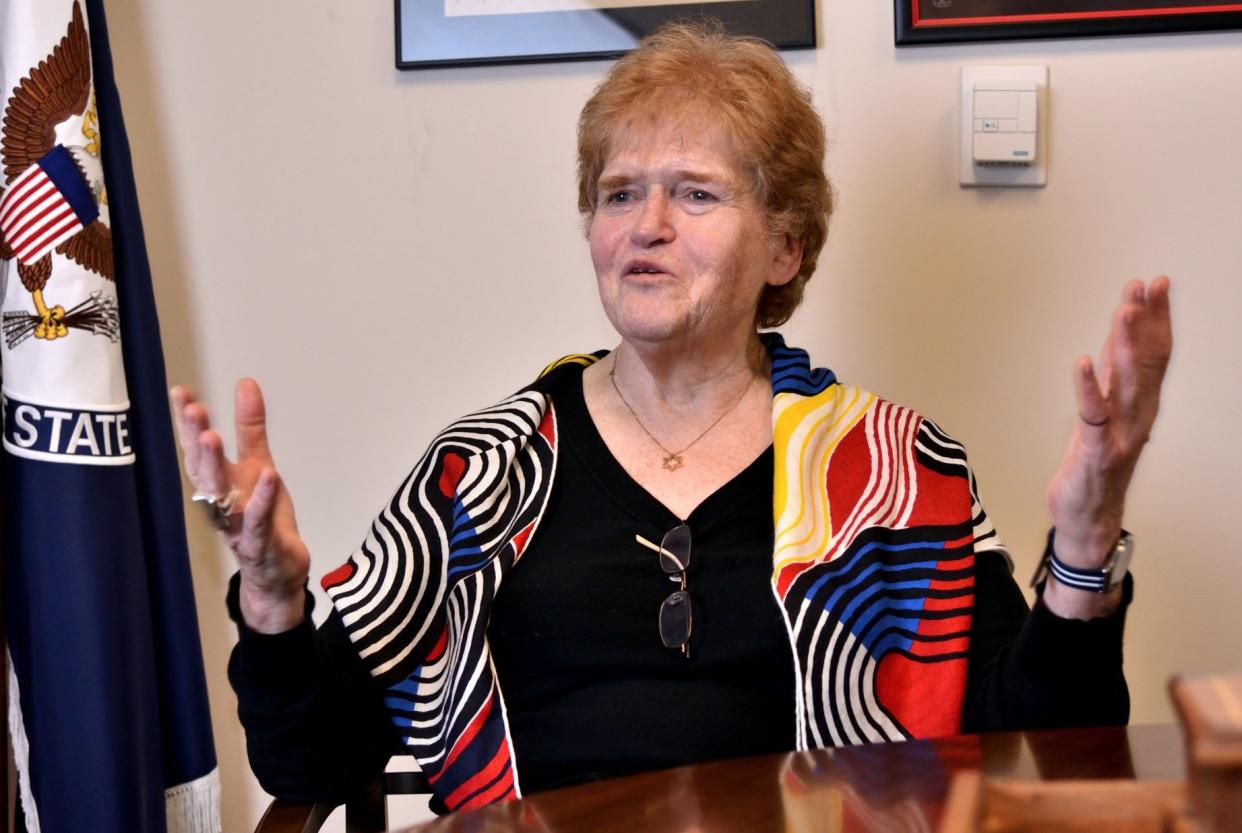
In the wake of the turmoil, Rishi Sunak delivered a rare address from the steps of No 10 to warn against the threat to the country’s democracy.
“It took a while for it to come,” says Lipstadt, with characteristic candour, “but I’m pleased the Prime Minister made a very strong statement.”
It reflects the message she delivers herself on the course of her travels.
She made the same argument during addresses at Birkbeck, University of London, the Royal United Services Institute (RUSI) and the London Centre for the Study of Contemporary Antisemitism, as well as meetings with the National Union of Students during her recent trip.
“So maybe my message seeped up to 10 Downing Street,” she says with a smile. “Because I do believe that what we’re facing is not just the threat to the Jews in north London or any other place like Manchester, Leeds … because this is the shutting down of democracy, and with that comes a threat to national stability and security.”
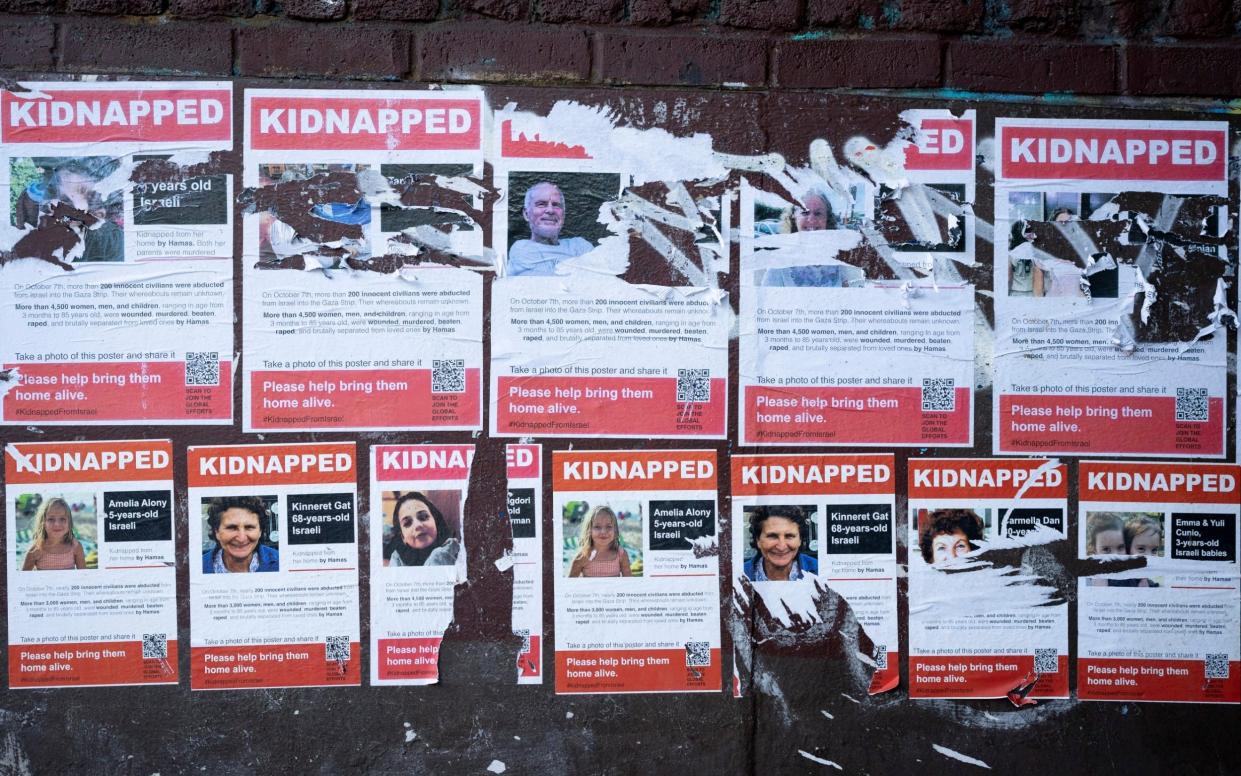
She discusses her concerns with politicians from across the aisle during her visits (this time with Yvette Cooper, Labour’s shadow home secretary; on previous visits with Lord John Mann and Lord Eric Pickles), before raising the case of Mike Freer, a justice minister who intends to stand down at the next general election following death threats after 14 years serving as the MP for Finchley and Golders Green.
“I think for him to not run because he’s afraid of threats to his family, that’s a threat to democracy,” says Lipstadt. “What is going on here that our elected officials should be resigning because of threats?”
On the morning of Oct 7, Lipstadt was in Rome, ahead of a private audience with the Pope at the Vatican. She was getting dressed to go to a synagogue to mark the Jewish holiday when the first reports of Hamas’s attack came in. By the time she arrived, more details had emerged, and the full scale of the terror group’s brutality was slowly becoming clear.
“As it began to unfold, that was quite, quite powerful,” she says. She recalls the confusion and incredulity she felt when the term “hostage” first began to circulate.
She went on to spend hours that day commiserating with members of Rome’s Jewish community. “We were just, it was …” her voice trails away and she casts her eyes down.
“I’ve been to Israel many times. I studied there. It was the first time we’ve seen an attack like that,” she says, as she tries to articulate how the attack affected her personally.
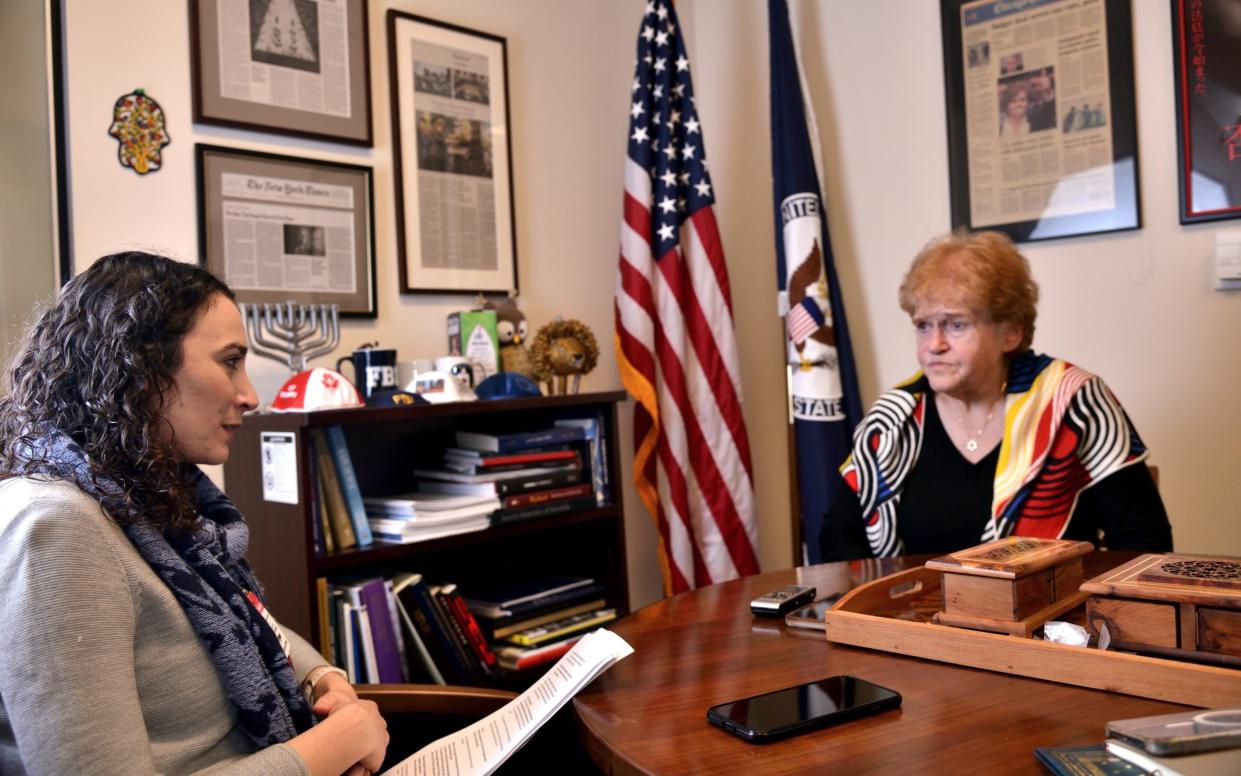
As a historian of the Holocaust, renowned for doggedly exposing the pervasive and intricate patterns of anti-Semitism, she recognised the significance of “the scale of the killings” on Oct 7. “It took a day or so, but as we began to get details … it really struck me that we were looking at the biggest, the most extensive murder of Jews since the Holocaust,” she says.
But just a few days after Oct 7, and even in the shadow of the week’s events, she was able to crack a few jokes with Pope Francis.
The Pope had recited “veritas est veritas”, truth is truth, after she thanked him for ordering the release of Vatican archives from the Second World War. “And without pausing for a moment, I said ‘and also in vino veritas’,” she recalls. The Pope didn’t quite know what to make of it, but offered a smile before the conversation turned serious.
Today I had the distinct honor of meeting with @Pontifex. We discussed the importance of opening the Pope Pius XII archives to accurately examine history and how we must strengthen Catholic-Jewish relations by addressing antisemitism through education. pic.twitter.com/NANk57jDlI
— Ambassador Deborah Lipstadt (@StateSEAS) October 12, 2023
She is more circumspect about her meetings with the victims of Oct 7, including released hostages, whom she has met in this very office, as well as in Israel and elsewhere. “I don’t have any right to push them,” she says. “I’m not representing them. I’m not making their case. I just listened to what they have to tell me.”
One released hostage, a young woman, was held in a family’s apartment in Gaza. While little children ran around outside, she was locked in a room with her kidnapper. She would occasionally get help to go to the bathroom from a woman in the family home, because her arm was too severely wounded for her to go unaided.
The injury may explain why she was released, while other women with her were not. “[They] asked her not to forget them,” says Lipstadt. “She should be resting and recuperating, but she feels compelled to travel around and tell her story” for their sake. That is the message those Lipstadt meets with want to share: don’t forget those left behind.
Those encounters have no doubt fuelled Lipstadt’s frustrations with the United Nations and other international bodies’ response to the attacks. She has highlighted the “double standard” in their reponse to the brutal crackdowns on Iranian women, Yazidi women, Nigerian girls at the hands of Boko Haram, with their comparative silence on the rapes of Israeli women.
The prevailing mood post-MeToo is “believe the women – and in this case it wasn’t”, she says. “The only difference we could find is the perception was, these were Jewish women.”
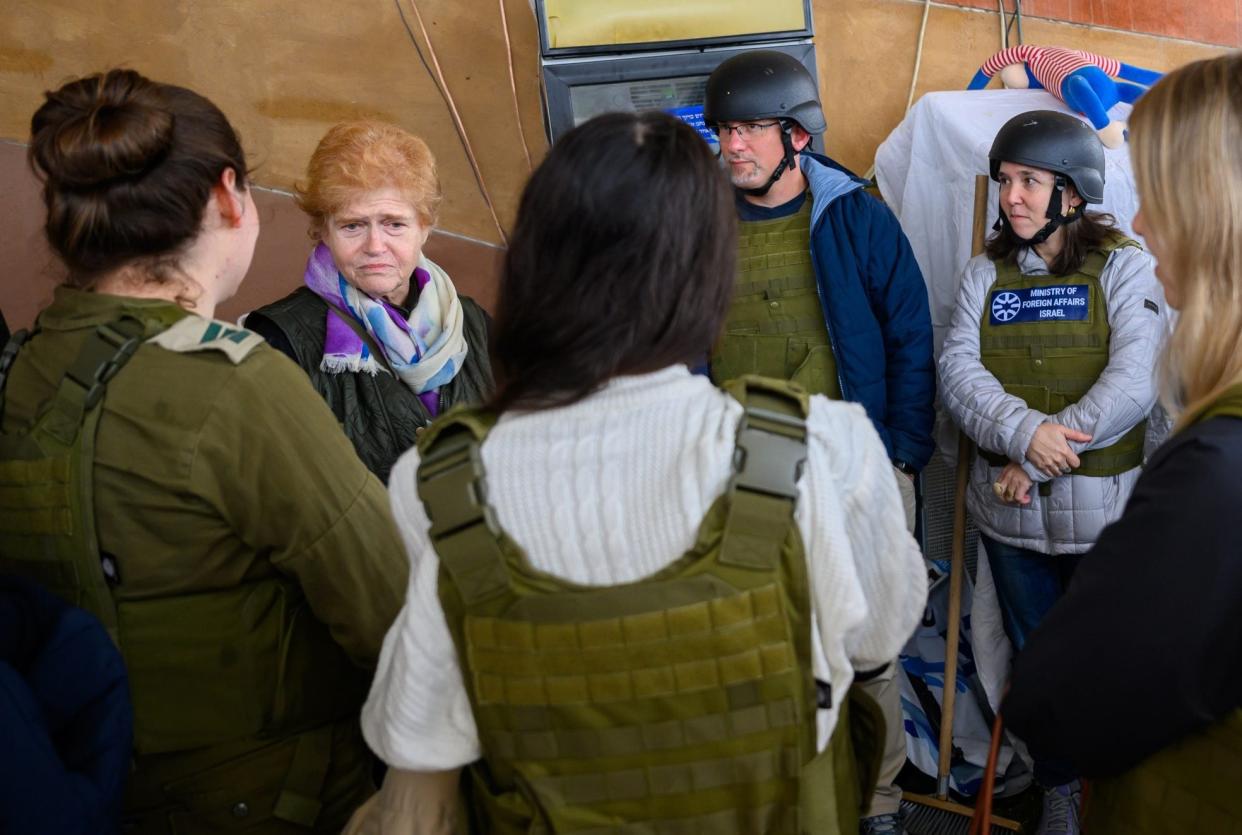
She aired her criticisms in a recent op-ed in The Guardian with her colleague Ambassador Michèle Taylor, America’s permanent representative to the UN’s Human Rights Council.
“Ignoring or delaying a response to credible reports of such horrific acts inadvertently validates the acts. It not only denies justice to the victims, but also emboldens the perpetrators,” the pair wrote.
Lipstadt reveals editors at other newspapers have since asked her why she chose to make her case in The Guardian, rather than in their own outlets. “I said, ‘because if I published it in The Wall Street Journal, I would have been preaching to the choir’.”
Does she feel liberal, Left-wing thinking has lost its way on the issue? Lipstadt says she prefers to think of the issue as a “horseshoe”; at their most extreme points, the two ends of the ideological spectrum meet.
But she is perturbed by the rise of anti-Semitism on the campuses of elite universities, and the prevailing attitude among some academics. The issue has ignited a firestorm in the US. In December, the presidents of Harvard, the University of Pennsylvania and MIT were hauled before Congress to answer for their institutions’ conduct in high-profile, televised hearings.
All three failed to categorically state that calling for the genocide of Jews violated their univeristies’ codes of conduct.
“It was terrible,” says Lipstadt. “What’s become quite clear is that education is not a magic bullet for stopping hatred and prejudice.”
“As I like to say, you can be a PhD and an SOB, son of a b—-, at the same time. You can quote me on that,” she quips, with evident enjoyment.
She is more equipped than most to pronounce on academics. Before joining the Biden administration, she spent her career teaching modern Jewish history and Holocaust studies in American universities, including three decades at Atlanta’s Emory University, where she helped establish the Tam Institute for Jewish Studies.
Prior to finding a global stage with the publication of her 1993 book Denying the Holocaust: The Growing Assault on Truth and Memory, and the ensuing legal battle with Irving, her career was not dissimilar to that of many successful academics.
Born to Erwin and Miriam Lipstadt in New York in 1947, she grew up in a “modern-Orthodox” home in Queens with older sister Helene and younger brother Nathaniel. They kept Kosher and the Shabbat, but also enjoyed the theatre. “Living with a leg in both worlds and enjoying both worlds very much,” as she puts it.
Her mother was born in Canada, her father left Weimar Germany in 1927, and the pair met at a synagogue in New York, where Lipstadt has familial ties. However, her base for decades prior to moving to Washington was in Atlanta, Georgia; she has a house and many friends in the southern city.
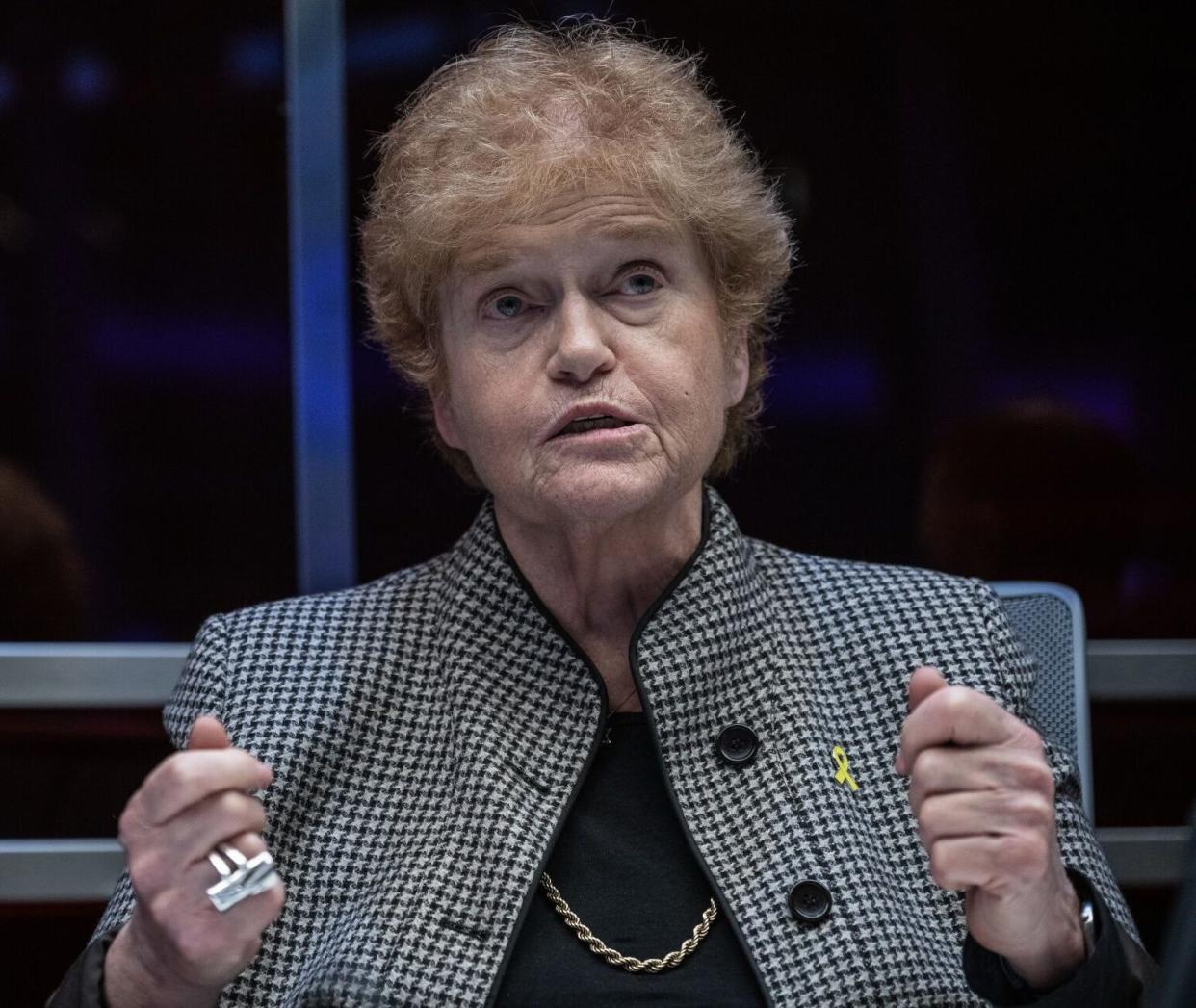
Her geographical spread is reflected in the practice of her faith: she currently belongs to two Orthodox synagogues, both because of their proximity to where she lives, and her enjoyment of the community. “I’m all over the place, put it this way, I would find it hard to categorise myself,” she says of her faith.
“Preferably, I like egalitarian services, but I also very much value Jewish community: having people with whom to celebrate, to pass milestones, people who share your values, your concerns, not to isolate yourself, but making that part of who you are as well.”
As an undergraduate, Lipstadt studied political science and history at the City College of New York, including a year in Israel. The Six-Day War interrupted her studies at Jerusalem’s Hebrew University, but the trip left a lasting impression, shaping her interest in Jewish history, and her later activism.
She went on to study under esteemed Jewish scholars at Brandeis University in Massachusetts, where she gained a PhD in Near Eastern and Judaic Studies in 1976. But it was while working as a professor of modern Jewish history and Holocaust studies at Emory University, and by now a renowned authority on the Holocaust, that in 1995 she received a letter from her publishers informing her that Irving was suing her for libel, for describing him as a “holocaust denier” in her book.
The six-year legal drama, when it finally came to the High Court in January 2000, prompted a media frenzy and effectively put the history of the Holocaust on trial. Incredibly, the outcome was far from certain, and the financial jeopardy to Lipstadt was as great as the potential reputational risk.
She hired Anthony Julius, who represented Princess Diana in her divorce, and the barrister Richard Rampton, to represent her. “It was difficult, but in the end, it was well worth it,” she says. “It’s humbling and it makes me feel like I did something very worthwhile, irrespective of how people feel about it.”
The final judgment (there was no jury) in April 2000 was damning for Irving, declaring him to be a Holocaust denier, an “anti-Semite” and a “racist”. The court costs, an estimated £3 million, bankrupted him.
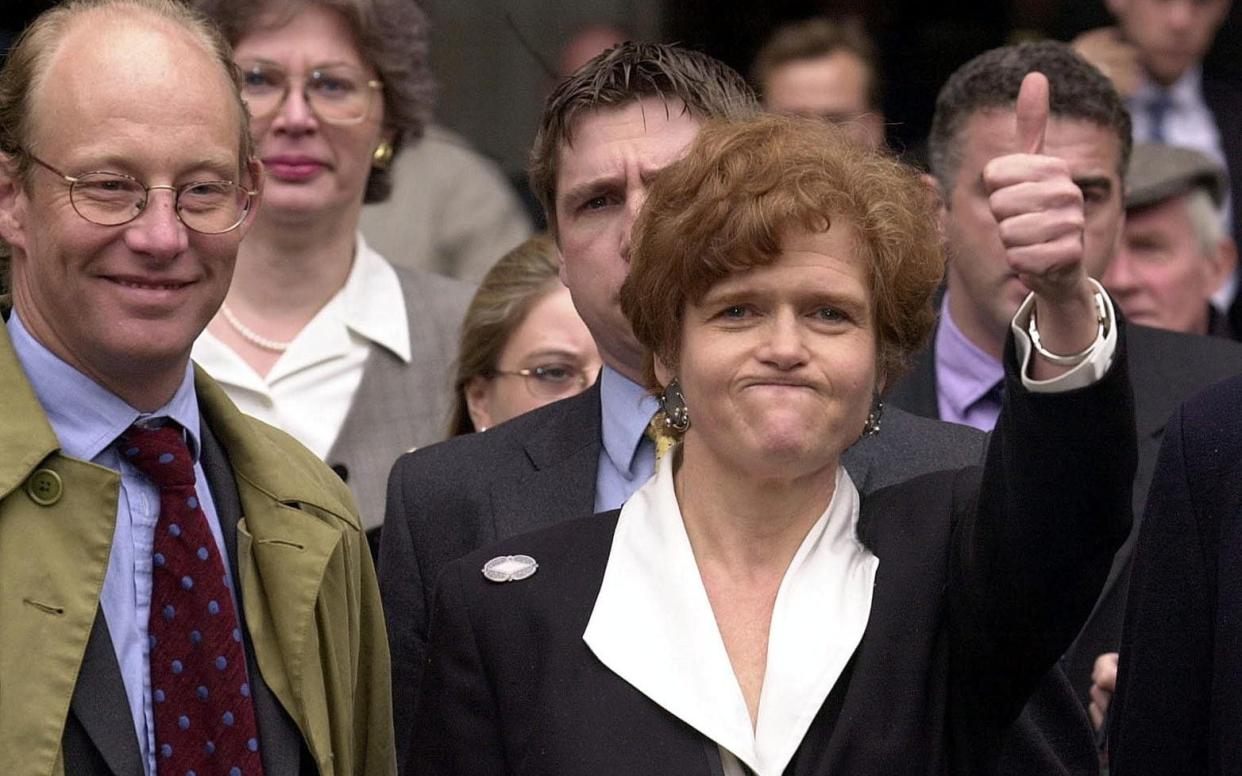
After the trial, Lipstadt returned to academia, now with an amplified platform. Her book about the trial became the basis for the film Denial starring Weisz and Spall. She returned to court again in 2021, this time as an expert witness in a trial following a white nationalist rally in Charlottesville, Virginia, in 2017.
One of the white supremacists had driven his car into a crowd of counter-protesters, killing a 32-year-old woman and injuring around 20 more. Following the rally, in which neo-Nazi marchers chanted “Jews will not replace us”, Donald Trump declared from the White House that there had been “very fine people on both sides”. Biden has said the comment prompted him to end his political retirement and run for president in 2020.
Months after assuming office in 2021, he nominated Lipstadt to be his special envoy to combat anti-Semitism, a post that had been elevated to the rank of ambassador with an office of roughly 14 staff and a budget of $2.5 million.
But first she had to get through a bruising confirmation process in the US Senate. The proceedings were stalled for eight months amid objections from Republicans. Lipstadt had previously accused the Trump administration’s “innermost circle” of “soft Holocaust denial”, and Ron Johnson, a Republican senator, of engaging in “white supremacy”.
She apologised to Mr Johnson during her confirmation hearing, for not being as “nuanced” as she would have liked, and was ultimately confirmed to the post in a bipartisan vote.
When I ask about a potential second Trump term, she immediately cuts me off. “I don’t want to talk politics,” she says, describing the work of her office as “above all that”.
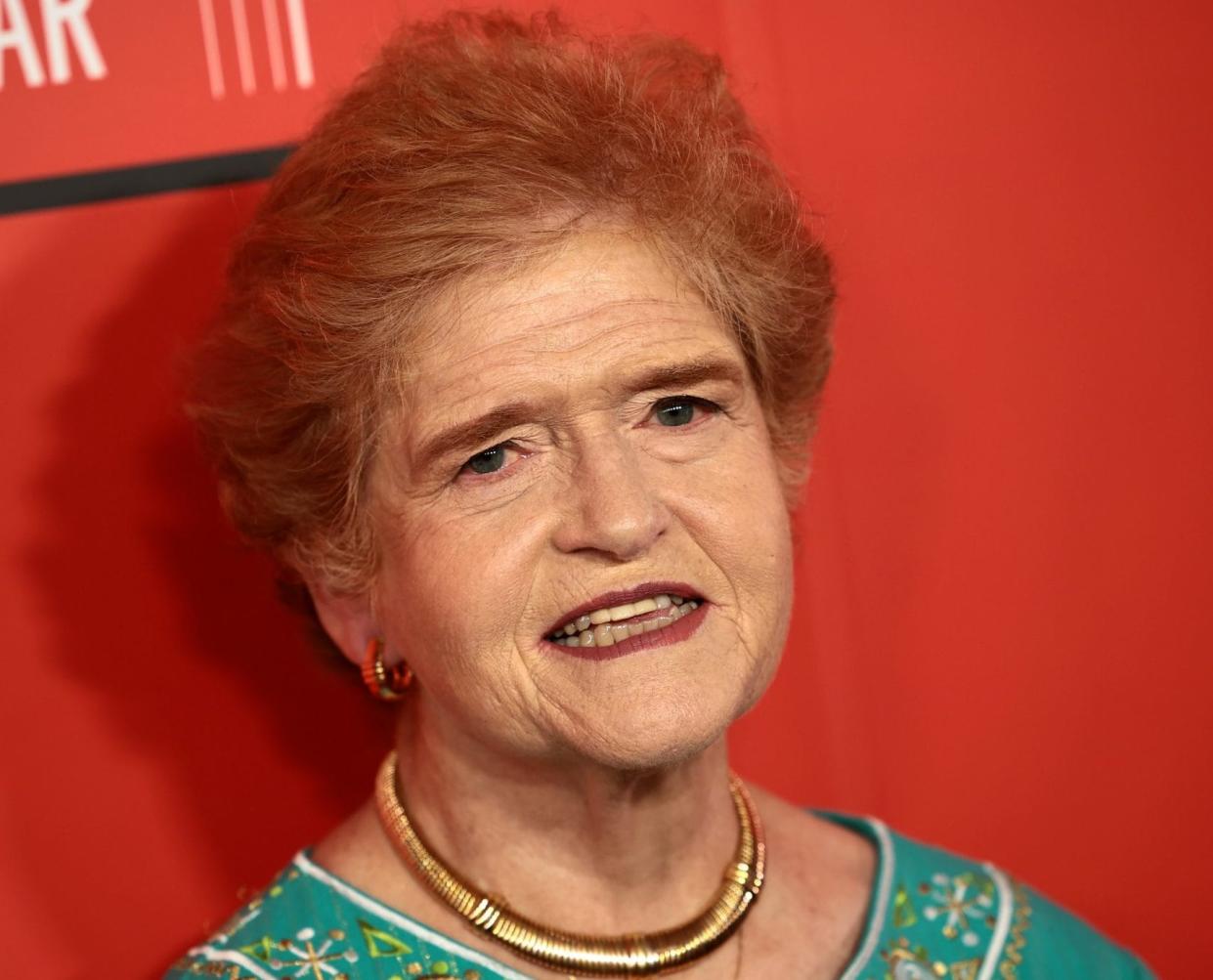
As the first office holder to hold the title of ambassador, Lipstadt’s role is more powerful than any of her predecessors. There is the pomp that comes with it (her rank is the equivalent to a four-star US general), but also the gravitas. When she meets with foreign governments, it is at the highest levels.
While she played a critical role in the Biden administration’s release of America’s first-ever national strategy for countering anti-Semitism, her main job is combatting anti-Semitism globally.
Her government work has gained her much recognition: Time magazine named her among its 100 most influential people of 2023. I ask if she has received extra security since taking on the job. “Better not to talk about that,” she says, waving the conversation on.
She is self-effacing about her role. When I ask about her day-to-day work, she shrugs and says “busy, busy”.
At the start of our interview she had apologised for being late; she has just come from a meeting that overran with Pramila Patten, the UN’s special representative on sexual violence in conflict, who recently published a report detailing the sexual assaults and rapes perpetrated by Hamas terrorists. And as we close there are a dozen or so people waiting for her to chair a staff meeting. Once or twice an aide looks in to hurry things along: she is also due on Capitol Hill later to testify before Congress.
Despite her ever-increasing in-tray, Lipstadt remains upbeat. Her trademark humour – a rare quality in a diplomat – is what helps her get through. “Sometimes it backfires,” she says, “But I think it’s the only way to do what we’re doing. Otherwise you sort of go crazy.”


